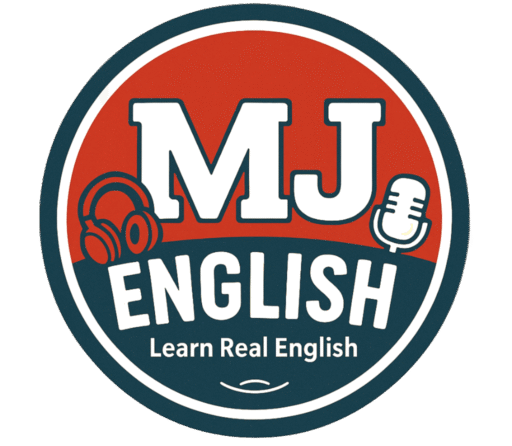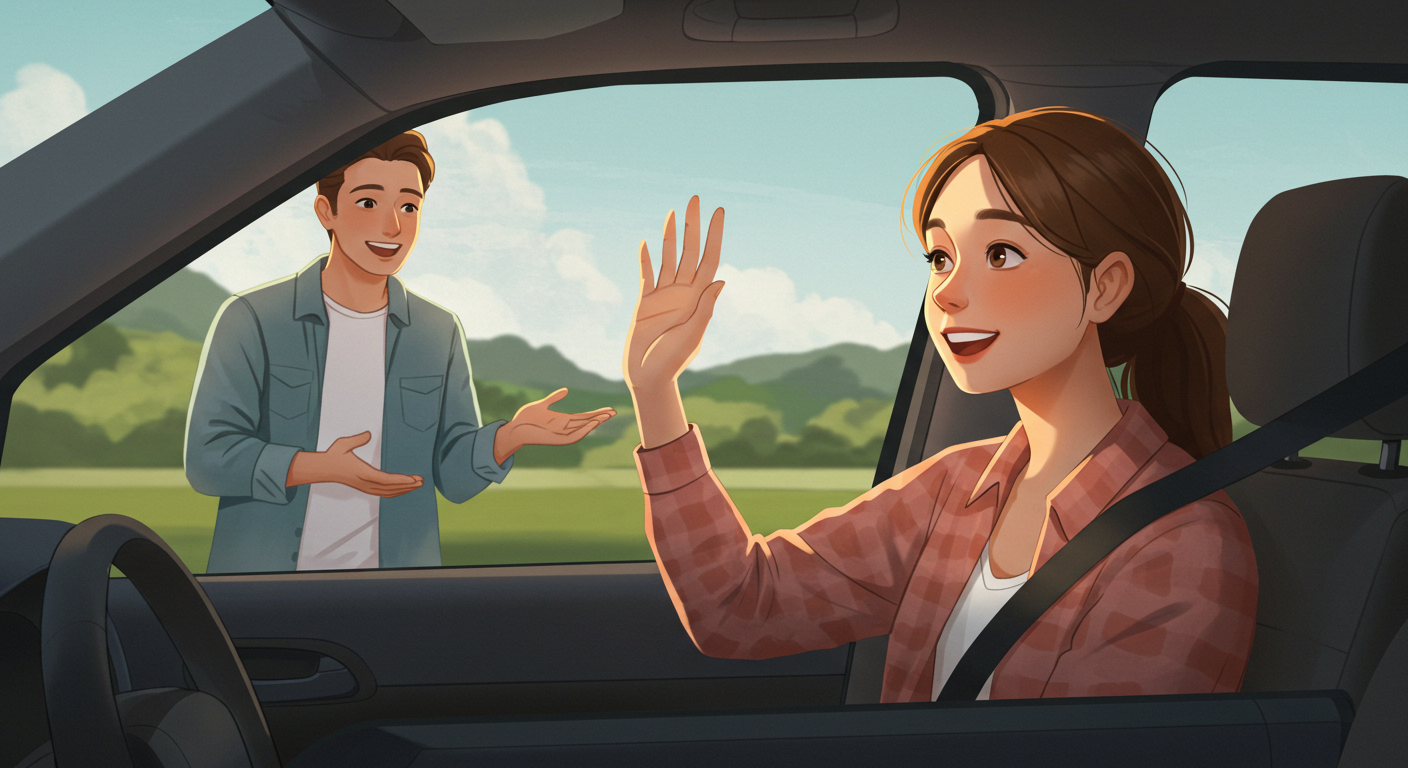週末外國朋友要開車來接你去看電影、唱歌或喝咖啡,
結果一上車只會說「Hi」?😅
今天要教你最實用的 carpool English!
從上車、聊天到下車道謝都自然又好用,
讓你在朋友面前講英文不再尷尬,開車聊天也能像美劇主角一樣自然💬🚗
🎧Apple Podcast | Spotify
💬 Dialogue|情境會話:朋友開車來接你去電影院
週末下午,Anna 開車到 Ben 家樓下,兩人一起去電影院。
English Dialogue
Anna: Hey Ben, I’m outside your place!
Ben: Great timing! I’ll be down in a sec.
Anna: Cool. I parked right in front of your building.
Ben: Thanks for picking me up. Mind if I sit in the front seat?
Anna: Of course not. Buckle up! Safety first.
Ben: Got it. So, how’s your day been?
Anna: Pretty chill. I just grabbed some coffee. Want one?
Ben: Sure! Oh, Could we drop by 7-Eleven real quick?
Anna: No problem. It’s on the way to the theater.
Ben: Thanks again for the ride.
Anna: Don’t mention it! You’re getting the popcorn later, right?
Ben: Haha, deal! I’ll pay for the popcorn and your drink.
Anna: Perfect! Let’s hit the road!
中文
Anna: Ben,我在你家樓下囉!
Ben: 太準時了!我馬上下去。
Anna: 我停在你家樓前面。
Ben: 謝謝你來載我~我可以坐前座嗎?
Anna: 當然可以,記得繫安全帶喔!
Ben: 好的~你今天過得怎樣?
Anna: 還不錯,我剛買了咖啡,要不要來一杯?
Ben: 好啊!我們可以順路去一下 7-11?
Anna: 沒問題,就在去電影院的路上。
Ben: 太好了,再次感謝你載我。
Anna: 不客氣~等等爆米花你要請喔!
Ben: 哈哈,成交!爆米花跟飲料我都包了。
Anna: 完美~出發吧!
📚 Vocabulary Boost|重點單字片語
| 單字 / 片語 | 詞性 | 中文意思 | 英文例句 | 中文翻譯 |
|---|---|---|---|---|
| ride | n. | 搭車、乘車 | Thanks for the ride! | 謝謝你載我! |
| buckle up | v. phr. | 繫安全帶 | Don’t forget to buckle up. | 別忘了繫安全帶。 |
| drop by | v. phr. | 順路去、順便拜訪 | Can we drop by 7-Eleven? | 我們可以順路去 7-11 嗎? |
| on the way | phr. | 在路上、順路 | It’s on the way to the theater. | 去電影院的路上就會經過。 |
| front seat | n. | 前座 | I’ll sit in the front seat. | 我坐前座。 |
| mind if… | phr. | 介意⋯嗎 | Do you mind if I open the window? | 你介意我開窗嗎? |
| hit the road | idiom | 出發、上路 | Let’s hit the road! | 出發吧! |
| pick up | v. phr. | 去接人 | Thanks for picking me up. | 謝謝你來接我。 |
| chill | adj./v. | 放鬆、輕鬆 | I just chilled at home all day. | 我整天都在家放鬆。 |
| deal | n. | 成交、一言為定 | It’s a deal! | 說定了! |
🔍 Sentence Patterns|重點句型
| 句型結構 | 中文意思 | 英文例句 | 中文翻譯 |
|---|---|---|---|
| I’m outside your place. | 我在你家樓下。 | I’m outside your place, come down when you’re ready. | 我在你家樓下,你準備好再下來。 |
| Mind if I + V? | 我可以⋯嗎? | Mind if I sit in the front seat? | 我可以坐前座嗎? |
| Can we drop by + 地點? | 我們可以順路去⋯嗎? | Can we drop by 7-Eleven? | 我們可以順路去 7-11 嗎? |
| Thanks for + V-ing. | 謝謝你⋯ | Thanks for picking me up. | 謝謝你來接我。 |
| Let’s hit the road! | 出發吧! | Let’s hit the road before it gets crowded. | 趁還沒塞車,我們快出發吧! |
| Don’t forget to + V. | 別忘了⋯ | Don’t forget to buckle up. | 別忘了繫安全帶。 |
| It’s on the way. | 在路上、順路 | Don’t worry, it’s on the way. | 放心,順路啦。 |
| You’re the best! | 你最棒了! | You’re the best, thanks for the ride! | 你最棒,謝謝你載我! |
📖 Transcript 逐字稿
M: Welcome to MJ English. Today, we’re going to explore some really practical English for when you’re, you know, riding in a car with friends.
M:歡迎來到 MJ English。今天我們要來學一些很實用的英文,特別是你跟朋友一起搭車時會用到的。
J: Like carpooling. We want to help you get beyond just saying “hi” when you hop in.
J:就是像共乘的時候。我們希望幫助你學會除了「Hi…」之外更多自然的說法。
M: It’s about making the whole interaction smoother, more natural.
M:就是要讓整段互動更順、更自然。
J: So we’ve got this example conversation between two friends, Anna and Ben. They’re heading to the movies.
J:所以我們準備了一段兩個朋友 Anna 和 Ben 的對話,他們要一起去看電影。
周末下午,美國人Anna 開車到 Ben 家樓下 ,兩人一起去電影院。
Anna: Hey Ben, I’m outside your place!
Ben: Great timing! I’ll be down in a sec.
Anna: Cool. I parked right in front of your building.
Ben: Thanks for picking me up. Mind if I sit in the front seat?
Anna: Of course not. Buckle up! Safety first.
Ben: Got it. So, how’s your day been?
Anna: Pretty chill. I just grabbed some coffee. Want one?
Ben: Sure! Oh, Could we drop by 7-Eleven real quick?
Anna: No problem. It’s on the way to the theater.
Ben: Thanks again for the ride.
Anna: Don’t mention it! You’re getting the popcorn later, right?
Ben: Haha, deal! I’ll pay for the popcorn and your drink.
Anna: Perfect! Let’s hit the road!
Anna: Ben,我在你家樓下囉!
Ben: 太準時了!我馬上下去。
Anna: 我停在你家樓前面。
Ben: 謝謝你來載我~我可以坐前座嗎?
Anna: 當然可以,記得繫安全帶喔!
Ben: 好的~你今天過得怎樣?
Anna: 還不錯,我剛買了咖啡,要不要來一杯?
Ben: 好啊!我們可以順路去一下 7-11?
Anna: 沒問題,就在去電影院的路上。
Ben: 太好了,再次感謝你載我。
Anna: 不客氣~等等爆米花你要請喔!
Ben: 哈哈,成交!爆米花跟飲料我都包了。
Anna: 完美~出發吧!
M: Okay, great reading. Lots of useful stuff in there.
M:OK,這段對話超棒,裡面有很多實用的句子喔。
J: So, let’s break some of that down. The first thing that jumps out is when Ben gets in and asks, “Mind if I sit in the front seat?”
J:那我們一段段來拆解。第一個很值得學的是 Ben 問的那句「我坐前座可以嗎?」
M: Yes, that’s a really key phrase.
M:對,這句超級實用。
J: Why “Mind if I…”? Why is that structure so… well, effective?
J:為什麼要說「Mind if I…」?這句型到底有什麼特別之處?
M: It’s about politeness, really. Asking “Mind if I…” plus a verb is super common. It’s softer, more indirect than just saying, “Can I sit there?”
M:其實就是一種禮貌的表達。「Mind if I + 動詞」這句型很常見,它比直接說「Can I…」來得更委婉更不突兀。
J: Right, less demanding somehow. It gives the driver—Anna in this case—an easy way to say no if she needed to, although she didn’t.
J:對,比較不會讓人覺得你在要求什麼。像這裡是 Anna 當司機,她如果想拒絕也比較好開口,雖然她最後沒拒絕啦。
M: And she replies, “Of course not.”
M:而她回答「Of course not」也很自然。
M: Then Ben immediately follows up with, “Thanks for picking me up.”
M:然後 Ben 馬上接著說「謝謝你來接我」。
M: Showing appreciation is important. And Anna’s response, “Don’t mention it,” is perfect.
M:表達感謝很重要。而 Anna 回的「Don’t mention it(別客氣)」也非常剛好。
J: Why “Don’t mention it”? What does that really signal?
J:那「Don’t mention it」這句到底代表什麼意思?
M: It basically cancels out any feeling of obligation. It means, “It was no big deal, you don’t owe me anything.” It keeps the friendship equal, you know.
M:這句話就是讓對方不用覺得欠你什麼,意思大概是「這沒什麼,不用放在心上」。也讓彼此的關係保持平等,不會覺得你欠我一個人情這樣。
J: Makes sense.
J:這樣說就通了。
J: Okay, moving on… safety.
J:好,接下來講安全的部分。
J: Buckle up.
J:繫好安全帶。
M: Yeah, straightforward command, but friendly. “Safety first.” Good reminder.
M:對,這句很直接但又很親切。「安全第一」是一個不錯的提醒。
J: And at the very end, Anna says, “Let’s hit the road.” That’s a classic
J:然後最後 Anna 說了「Let’s hit the road」
M: It’s a very informal way to say, “Okay, let’s get going.” It signals the start of the journey proper.
M:這是一種很口語的說法,意思是「走吧,出發囉」,表示真的要開始行程了。
J: What about making requests during the trip? Ben needed to stop.
J:那如果旅途中要提出請求呢?像 Ben 想停一下。
M: He asked, “Could we maybe drop by a 7-Eleven real quick?” The key parts there are “drop by” and “real quick.”
M:他說的是「Could we maybe drop by a 7-Eleven real quick?」這句裡面「drop by」跟「real quick」是重點。
J: “Drop by” sounds casual, like a small detour.
J:「drop by」聽起來很輕鬆,就是順路繞過去一下的感覺。
M: And he adds the justification: “It’s kind of on the way to the theater.” That’s important.
M:而且他還補了一句「它剛好在去電影院的路上」,這句很關鍵。
M: Saying “it’s on the way” makes the request seem much smaller, easier to agree to. It’s not a big inconvenience.
M:說「剛好順路」會讓這個請求聽起來很小、很容易接受,對方不會覺得麻煩。
J: Got it.
J:了解。
M: Then they do that little negotiation about the popcorn.
M:接著他們還有一段爆米花的小談判。
J: Yeah, that was fun. And they seal it with just one word.
J:對,那段很好玩。而且他們只用一個字就成交了。
M: Deal.
M:「Deal(成交)」
J: “Deal” or “It’s a deal.”
J:可以說「Deal」或是「It’s a deal」。
M: Very common for informal agreements. It shows everyone’s happy and the discussion is closed.
M:這種說法在非正式協議裡超常見,表示大家都同意,話題也到這邊結束。
J: So, wrapping this up, these phrases seem simple, but they really help manage the whole social side of sharing a ride.
J:總結一下,這些句子看起來簡單,但其實能大大改善整個搭便車的社交互動。
M: Using “Mind if I…”, “Thanks for…”, “Don’t mention it,” “drop by,” “on the way,” “hit the road,” and “deal”—these will make your English sound much more natural in these situations.
M:像是「Mind if I…」、「Thanks for…」、「Don’t mention it」、「drop by」、「on the way」、「hit the road」、「deal」這些句子,都能讓你的英文在這種情境下更自然流暢。
J: So you can sound more fluent and just, navigate these moments really smoothly.
J:這樣你聽起來會更像母語者,也能更自然地應對這些小互動。
M: Want the full transcript, key vocabulary, and useful sentence patterns? Just click the link below.
M:想要完整逐字稿、關鍵單字還有實用句型整理嗎?只要點下面的連結就可以囉!
J: Definitely check that out. Practice these, and you’ll feel more confident next time you’re catching a ride.
J:一定要去看看,多練習這些句子,下次搭便車你就會超有自信!
M: It’s all about understanding that kind of unspoken flow of conversation.
M:重點是掌握這種「不言而喻」的對話節奏。
M: See you next time on MJ English.
M:我們下次 MJ English 再見囉!
✅ Quick Check|小測驗時間
📌 延伸閱讀建議
- 【日常英語】上學遲到英文怎麼說?學會早晨交通全表達
- 【朋友英文會話】約朋友吃飯、看電影的英文說法全攻略
- 【生活英文】搭計程車英文教學:上車、報地點、付錢一次學會



